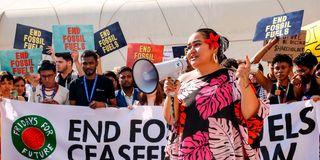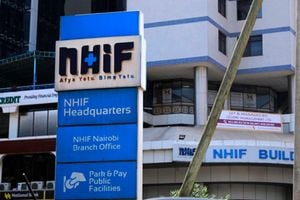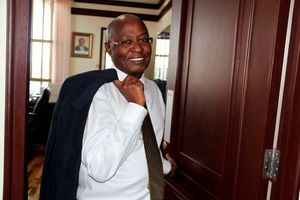UAE announces Sh34bn funding for African youth

South from Fridays for Future organization stage a protest calling to cease fires and end fossil fuels in the conference venue, Blue Zone during the COP28, UN Climate Change Conference, held by UNFCCC in Dubai Exhibition Center, United Arab Emirates on December 8, 2023.
What you need to know:
- The fund is a big game changer for the millions of youth in the continent, as it will help drive better health outcomes for African youth.
- This came on the background of heated deliberations as COP28 entered its homestretch, with the stakes rising high for everyone involved.
The United Arab Emirates (UAE) recently announced a new $220 million (Sh33,902,000,000) funding package for African youth as the COP28 curtains came down in Dubai Expo City. The good news was revealed during the Youth, Children, Skills and Education Day.
The fund is a big game changer for the millions of youth in the continent as it will help drive better health outcomes for African youth. This came on the background of heated deliberations as COP28 entered its homestretch, with the stakes rising high for everyone involved.
The funding by UAE is one of the crucial decisions and commitments the rich Middle-East country made as a host nation and is seen by experts as a crucial decision that will shape the future of global climate action and tilt the balance towards achieving net zero.
Sheikh Shakhboot, minister of State in the Ministry of Foreign Affairs, made the health package announcement for African youth. Sheikh Shakhboot said the UAE was alive to the fact that investing in the health of young people in Africa will ensure they have equal opportunities to thrive.
“When health improves, life improves,” he said, adding: “Working together with countries and governments, the UAE’s investment will help build a stronger and more climate-resilient health system (for) children in Africa, support access to essential care and ensure no communities are left behind.”
“By investing in youth we can unlock the potential of millions of young people across Africa and ensure a brighter tomorrow. By providing these essential building blocks — health education and economic opportunities — we are ensuring that they will and can build the future,” he explained.
At the heart of these negotiations, the atmosphere is normally charged with anticipation and urgency as negotiators burn the midnight oil to debate the final outlook of global goals for adapting to climate change. For the youth, the outcomes from these climate talks will shape their participation in the COP process.
In September, the African Youth Climate Assembly (AYCA) held a summit in Nairobi ahead of the Africa Climate Summit and came up with a declaration that captured the goals and desires of youth in the climate change sphere.
The assembly lead, climate activist Elizabeth Wathuti, said the current climate crisis the world is facing today “prompted this response mechanism of aligning and uniting with the African youth.”
“For so long, young people have been at the periphery. We get invited to conferences and meetings but are excluded from the decision-making process. That is why we are not calling for the inclusion of young people into these spaces but integration,” she said. That message was resounded during the launch of the first-ever Youth Stocktake, a groundbreaking initiative that conducted a comprehensive analysis of youth engagement in climate diplomacy.
In 2021, a study on public opinion on climate change revealed that two-thirds of the world believes there is a climate crisis, with youth under 18 the most likely group to believe climate change is a global emergency. Another research of 10,000 youth indicated that 50 per cent, globally, felt sad, powerless and helpless about climate change, and 45 per cent said their feelings about climate change negatively affected their daily life and functioning.
Developed in collaboration with YOUNGO, the children and youth constituency of the UN Framework Convention on Climate Change, the youth stocktake presented a strategic blueprint aimed at enhancing youth participation in the COP process. Their call is for improved global climate education.
The initiative garnered support, with 38 countries committing to sign the UNESCO Greening Education Partnership Declaration, which takes an education approach in the fight against the climate crisis. COP28 president Sultan Al Jaber said, “This COP is building a global legacy, defying expectations to ensure full inclusivity at the heart of the climate process, creating a better future for youth and children.”
Shamma Al Mazrui, a youth climate champion, advocated for the inclusion of youth voices and children. “At this COP, we have witnessed unprecedented initiatives fostering children and youth inclusion. Today, and all the activity that has led to it is focused on catalysing transformative change that will stand as a legacy for future COPs.”
In addition to addressing climate education, the “Youth Day” highlighted the importance of future skills, providing young people with opportunities to connect with potential employers and access funding.





